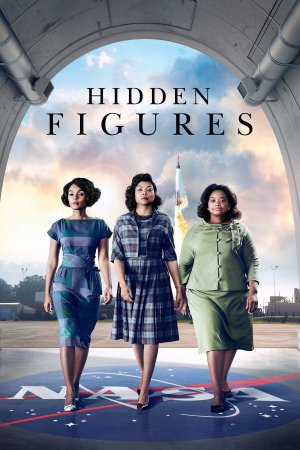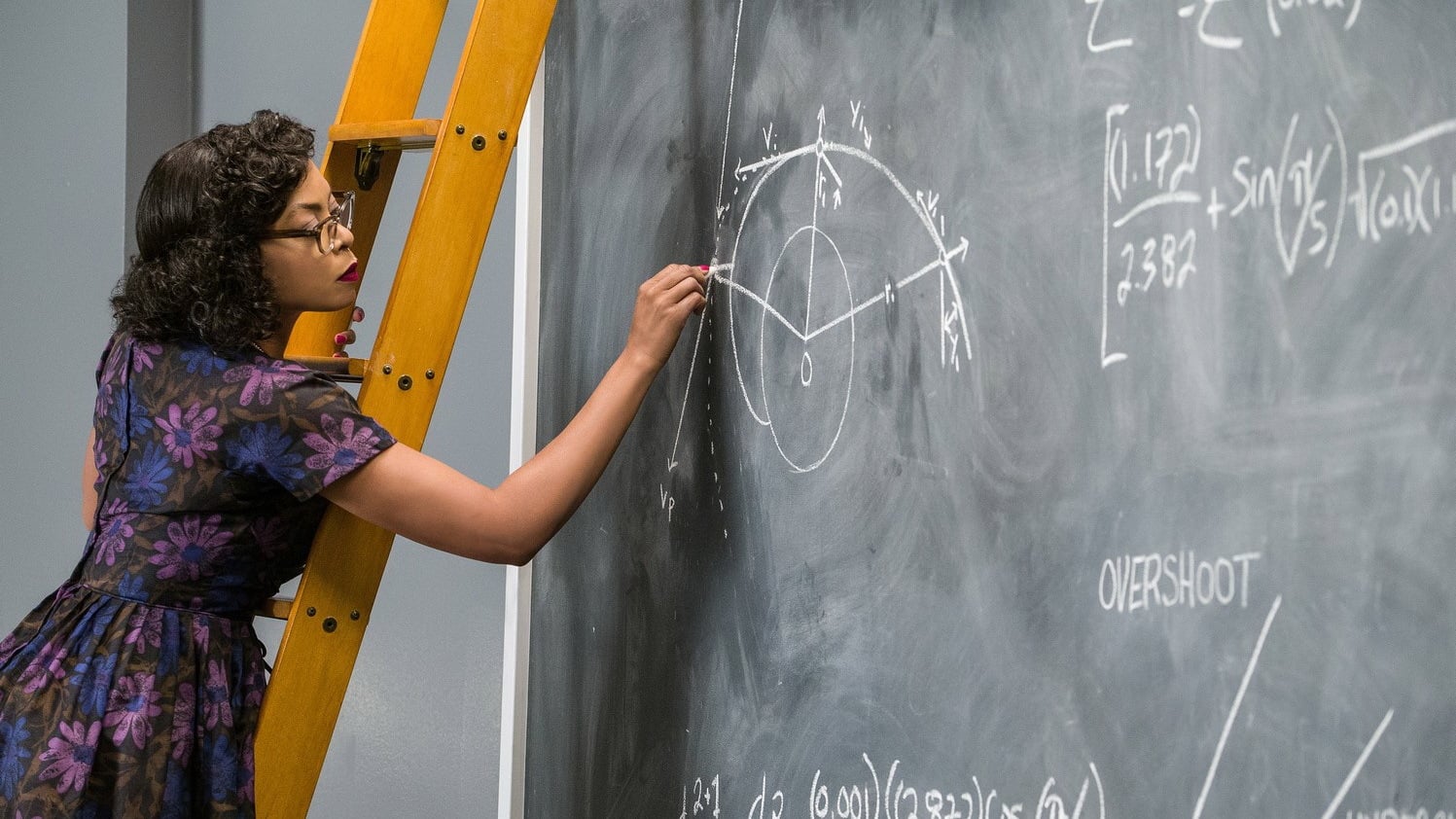
A review in brief
The trailer for Hidden Figures included a line of dialogue so utterly wretched in its flat-footed expository gracelessness that I maintained some hope it was one of those things that was only ever shot to give maximum possible clarity to the ads. Silly me. In fact, the version of the line that shows up in the first seven minutes of the film is even worse: "Three Negro women are chasing a white police office down the highway in Hampton, Virginia, 1961. Ladies, that there is a God-ordained miracle." I would dearly love to report that this is as bad as gets, but no, that's pretty much the level at which the entire screenplay by Allison Schroeder and Theodore Melfi (the latter also directs) operates. Anything that can be explained to the audience in tin-eared, hyper-literal dialogue will be, usually twice.
In other words, it's the end of December and we're getting a painfully earnest paint-by-numbers biopic about people who were almost beyond a shadow of a doubt more interesting than the film ever suggests. Same as it ever was, with the not-incidental detail that in this case, the film's subjects were three African-American women, which was a double strike against their prospects for showing their exemplary skills with math and engineering the halls of white male enclave NASA, in the early days of the space race. If we're going to be subjected to the milquetoast-to-shitty likes of A Beautiful Mind (which the film strongly evokes in its opening scene, earning my immediate ire) and The Imitation Game every autumn, we might as well ask that they represent a fully diverse cross-section of humanity, but equality in mediocrity is hardly the stuff of inspirational cinema.
The real-life story is pretty damn great, at least. The chief among our hidden figures was Katherine Johnson (Taraji P. Henson), one of the critical math geniuses who was instrumental in calculating flight trajectories for the Mercury, Gemini, and Apollo programs, and was considered to be the best of the best to such a degree that John Glenn, at least, refused to launch until he'd been assured that she had personally okayed the figures for his flights. The others were Dorothy Vaughan (Octavia Spencer), who was primarily responsible for integrating digital computers into the NASA workflow, and Mary Jackson (Janelle Monáe), who became the first African-American to complete the training required for high-level engineering work at the agency. The trio of actors are generally very good at inhabiting these people, with Henson especially standing out at combining the vaguely distracted look that connotes "knows math" in movies with a barely-visible but omnipresent anger at the unfair, bigoted world she has to inhabit; as the comic relief in a generally comic film, Monáe is even better here than in Moonlight (with a substantially easier part, to be fair), and between the two films has officially established herself as an interesting movie actor. Spencer is, basically, just playing the Octavia Spencer Character, but she does so well.
The issue is not the characters, then, but the fact that the characters don't really do anything. Their historical achievements are more about who they were than the specific actions they performed, which is a common enough problem with biopics; the bigger problem still is that their achievements were all math-related, and I think we've more or less proven by this point that math is boring in movies (the opening scene of Werckmeister Harmonies notwithstanding). Hidden Figures has enough of a sense of humor, and a strong enough bench of supporting players - Mahershala Ali, Kirsten Dunst, Kevin Costner as the increasingly stock "Kevin Costner is the Good White Guy" boss - that at least it's more entertaining than The Imitation Game, which really had no damn excuse to be as tepid and tedious as it was. The core problem is the same, though: people working figures isn't visually interesting, and there's nothing in Melfi's dreary, center-punched compositions to compensate for that. Every year needs its suffocating middlebrow Oscarbait, and Hidden Figures is 2016's; I hope the internet is right that this will be of some social benefit, because it sure as hell hasn't got any artistic merit.
In other words, it's the end of December and we're getting a painfully earnest paint-by-numbers biopic about people who were almost beyond a shadow of a doubt more interesting than the film ever suggests. Same as it ever was, with the not-incidental detail that in this case, the film's subjects were three African-American women, which was a double strike against their prospects for showing their exemplary skills with math and engineering the halls of white male enclave NASA, in the early days of the space race. If we're going to be subjected to the milquetoast-to-shitty likes of A Beautiful Mind (which the film strongly evokes in its opening scene, earning my immediate ire) and The Imitation Game every autumn, we might as well ask that they represent a fully diverse cross-section of humanity, but equality in mediocrity is hardly the stuff of inspirational cinema.
The real-life story is pretty damn great, at least. The chief among our hidden figures was Katherine Johnson (Taraji P. Henson), one of the critical math geniuses who was instrumental in calculating flight trajectories for the Mercury, Gemini, and Apollo programs, and was considered to be the best of the best to such a degree that John Glenn, at least, refused to launch until he'd been assured that she had personally okayed the figures for his flights. The others were Dorothy Vaughan (Octavia Spencer), who was primarily responsible for integrating digital computers into the NASA workflow, and Mary Jackson (Janelle Monáe), who became the first African-American to complete the training required for high-level engineering work at the agency. The trio of actors are generally very good at inhabiting these people, with Henson especially standing out at combining the vaguely distracted look that connotes "knows math" in movies with a barely-visible but omnipresent anger at the unfair, bigoted world she has to inhabit; as the comic relief in a generally comic film, Monáe is even better here than in Moonlight (with a substantially easier part, to be fair), and between the two films has officially established herself as an interesting movie actor. Spencer is, basically, just playing the Octavia Spencer Character, but she does so well.
The issue is not the characters, then, but the fact that the characters don't really do anything. Their historical achievements are more about who they were than the specific actions they performed, which is a common enough problem with biopics; the bigger problem still is that their achievements were all math-related, and I think we've more or less proven by this point that math is boring in movies (the opening scene of Werckmeister Harmonies notwithstanding). Hidden Figures has enough of a sense of humor, and a strong enough bench of supporting players - Mahershala Ali, Kirsten Dunst, Kevin Costner as the increasingly stock "Kevin Costner is the Good White Guy" boss - that at least it's more entertaining than The Imitation Game, which really had no damn excuse to be as tepid and tedious as it was. The core problem is the same, though: people working figures isn't visually interesting, and there's nothing in Melfi's dreary, center-punched compositions to compensate for that. Every year needs its suffocating middlebrow Oscarbait, and Hidden Figures is 2016's; I hope the internet is right that this will be of some social benefit, because it sure as hell hasn't got any artistic merit.
Categories: joyless mediocrity, oscarbait, the dread biopic






